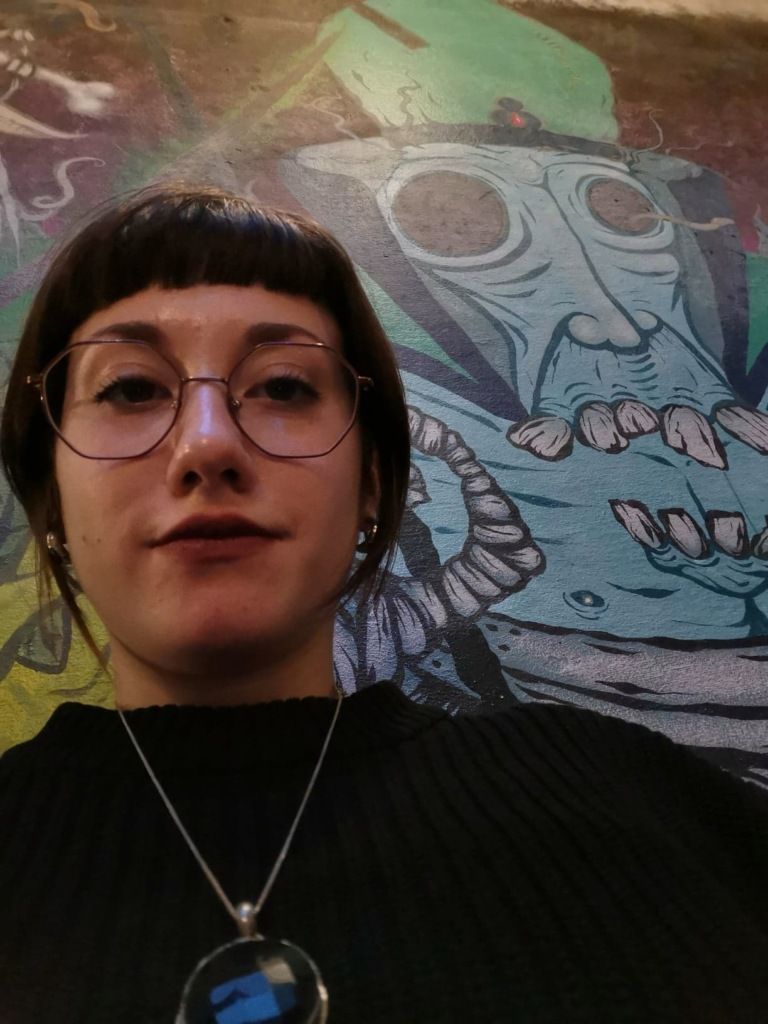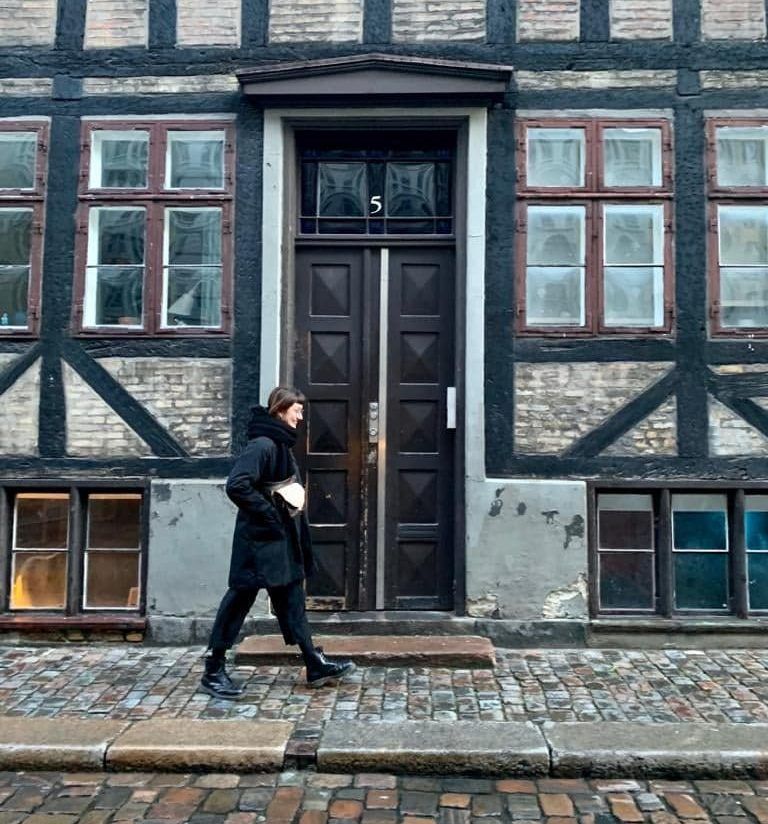I took the train the Saturday before the hairdressers opened – in the early afternoon. As it made its way through cities like Ringsted and Roskilde, it got pretty packed – there were at least two people sitting less than two metres away from me, another breathing with slight difficulty just a little beyond that famous distance. She was 16 maybe, so she probably won’t die, or need a ventilator, but perhaps she passes it on to the guy in front of her, who in turn has a father who contracts the virus and dies. After all, a 36-year-old man passed away recently without any known diseases whatsoever.
We’re reopening and you can get a tattoo, but eight people still died today in Denmark with the coronavirus.
So, with all the fuss about the great projections and opening Denmark up again, this might be a good time to remember what some call yesterday’s news, others are tired of hearing about, and what we’ve all discussed so much already: the ongoing tragedy in the US, Spain and Italy.
Corruption and distrust
More than 27,000 people have been killed by the coronavirus in Italy so far and, though the country is already thinking about opening up again, 464 died only a week ago on April 23. I talked to Camilla Ferri, a 20-year-old Italian expat in Copenhagen, about the outbreak and everything that has followed:
“I think Italy’s problem is related to corruption and to the Italian attitude to not follow the rules. If people had followed the lockdown’s red area guidelines at the very beginning of the story, the situation would be so much different now. This attitude is very rooted in our culture. People don’t trust the political system too much,” she contended.
I asked Ferri what she meant by corruption: “Before the prime minister revealed the decision to place northern Italy under a lockdown and quarantine residents, people already knew about it. Many went crazy, trying to catch the last train from the north to the south of Italy. So, many basically escaped the lockdown because someone leaked the prime minister’s initiative to the press. Some of these people have already been infected and thus spread the virus to southern Italy as well,” she explained.
“So, was this a corruption issue? Someone leaked the info for money?” I inquired.
“It might have been. This is something I assumed. It’s hard to say, but corruption is always there. But even if it wasn’t corruption, it was at least irresponsibility by politicians.”
“Dear foreign friends, I am writing this post because…”
During the dawn of the crisis in Denmark, Ferri posted a message on the Expats in Copenhagen Facebook forum, warning people to avoid the situation her country found itself in: “The entire health system is collapsing, there are simply too many people in need of intensive care,” she wrote. “In some hospitals, they are forced to decide who to assist based purely on a patient’s chances of survival.” This was on March 14, the day after Mette Frederiksen announced the closure of Denmark’s borders.
“I never ever post anything on Facebook. But I was wondering about the way people were reacting to the Danish government’s actions and I felt they were reacting exactly the same way as my Italian friends did in Italy a few weeks before. So I thought: ‘This is crazy; we’ve been through this before in Italy and we ended up in the chaos we are in. And we can prevent this in other countries, but we can only do that if we look at places like Italy, where everything has gone wrong, much worse than in Denmark, and try to learn something.’”

They just don’t really get it
“I talked to Danish and foreign friends at the time and I had this feeling that they were not willing to stay home during the weekend or to reduce social interaction.”
“So they were not taking it seriously enough?”
“No. Though Denmark doesn’t have the Italian problem of citizen distrust in the government, they were underestimating the problem basically.”
After all the government initiatives, things changed slightly during the strictest period of the lockdown, but Ferri still didn’t feel that the gravity of the situation has quite been able to sink in as it should have: “I think they have changed their habits not so much because they’ve understood the situation but because they were forced to do so. They followed the rules, it’s what they had to do.”
“I have heard people saying things like: ‘Only old people can die from this virus’ and that not going out on weekends is ridiculous and too extreme,” her Facebook post continued. “First of all, I would like you to think of how inconsiderate this thought is and, secondly, I want to remind you of all those young people whose immune systems are weaker than others (i.e those who have cancer, autoimmune diseases, etc).”
Pretty safe nonetheless
Despite what seems to Ferri like a lack of real understanding among some Copenhageners, she did feel much safer in Denmark than she would have in other countries, thanks to actions taken by the government: “I think the government acted quite promptly. Quicker than countries like France or Germany. I lived in London for a while, and if I would’ve been in London during the outbreak, I would not have felt safe at all due to the position that Boris Johnson originally took. He was too late – I heard of people still going to work and school long after much of Denmark was already closed down.”
But not as safe as it could be
According to an Aarhus University research project called ‘HOPE How Democracies Cope with Covid-19’, preventative behaviour in Denmark has been gradually falling in the past weeks regarding hand hygiene, the extent to which people avoid gatherings of more than ten and whether they have changed their behaviour in general. But even around the time such conduct was peaking, things weren’t as good as they should’ve been according to Ferri: “We could have done more. When I went out to the supermarket, I didn’t see any attention being paid to this. The cashier didn’t wear gloves; people didn’t really pay attention to the social distancing. And this is still the case.”
What she told me sounded very familiar, so I asked: “Do you think that the highly publicised stickers on the floor and the staggered queues are not of much help – since people already bump into each other so many times before they even get there?”
“Yeah, exactly. Also, sometimes when I went out, I saw so many people and, of course, I was one of them… but at least I was alone. Now I try to avoid crowded places. For example, I stopped going to The Lakes because there were so many people there.”
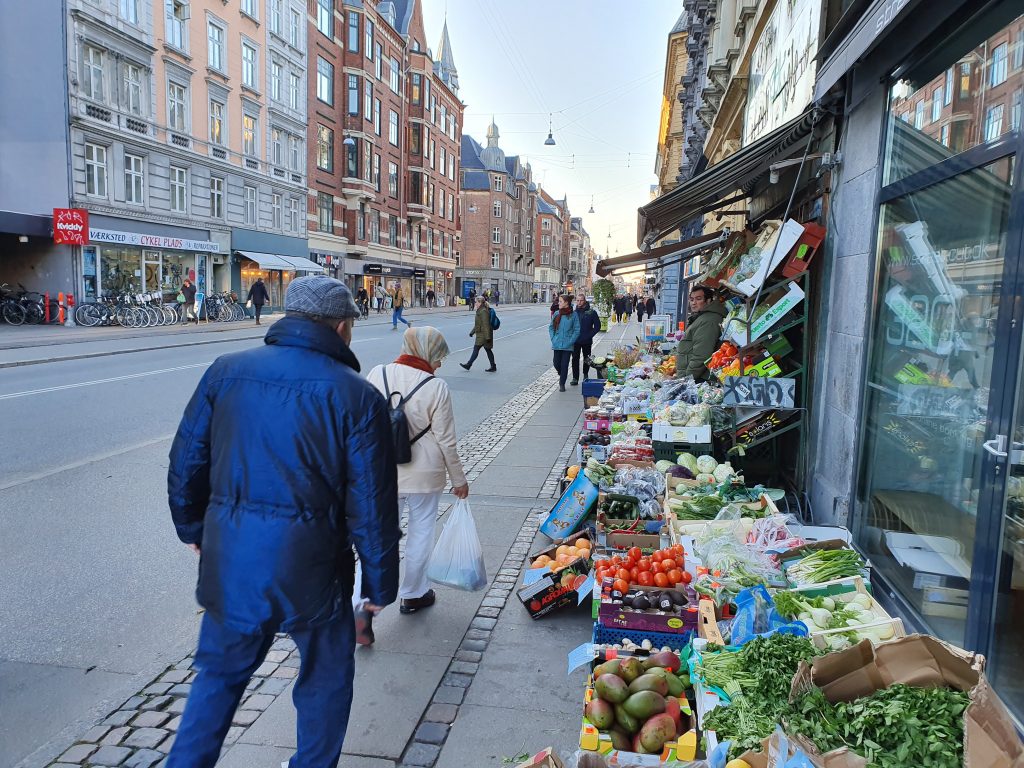
No pizza, grazie – just a sister and a friend
One of the first things Ferri did to reduce her own risk of getting and spreading the virus was to quit the pizza place she worked at – Da Aldo Pizzeria. She did this already before the restaurant was forced to close its doors after the March 17 press conference: “I was trying to reduce any interaction. So I told my boss I would rather stay home,” she told me.
She has been trying to limit herself on the social front as well: “I only saw my sister once and a friend of mine twice in 20 days basically. And I’ve decided to see only them because I know that they are passionate about keeping others safe and they don’t go out much. I also know who they see.”
“So how did you do it – did you keep the two metres distance or…?”
“It’s really hard to do …”
“I know,” I told her, remembering the times I broke the rule myself.
“But we don’t hug each other when we meet, you know – we try to keep some distance. And of course we don’t share anything. Like a bottle of water – anything.”
Family and friends in Italy
One of Ferri’s sisters studies in Denmark, but the rest of their family are pulling through in one of the countries that took the hardest blows from the pandemic: “Although, I come from Tuscany, which is not the worst part.” Ferri’s mother – who sells coffee beans and machines – is still allowed to go and deliver her products to customers. However, demand has more than halved since the outbreak and she is extremely worried about her livelihood: “She’s still going out – she still has customers – but if she couldn’t deliver the coffee, she couldn’t make a living. This is a very common feeling in Italy right now: people feel left alone as a result of the economic situation, which is completely different from the Danish one.”
As for vulnerable acquaintances, Ferri has one friend who falls into that category: “He was born with a problem in his spine and he also had a lung issue a year ago. If he gets it, he might die. So his parents are extremely careful – they avoid going out and, when they do, it’s only to go to the supermarket. They also wear gloves and masks and everything.” This careful behaviour has paid off since Ferri’s friend is still corona-negative and doing well.
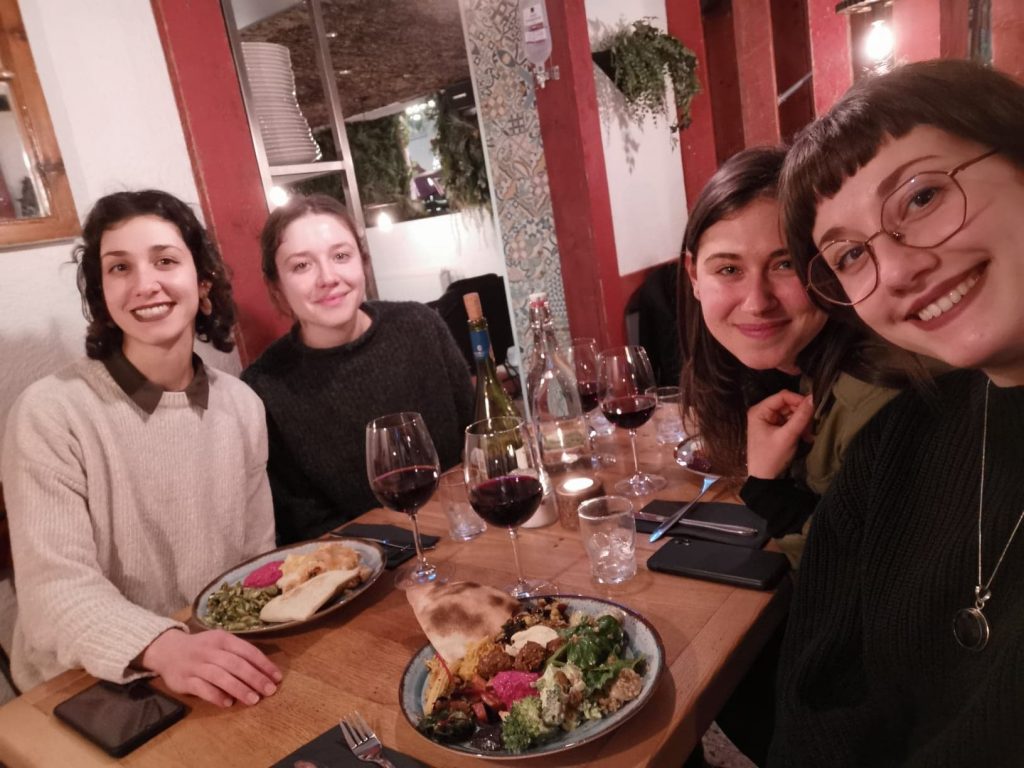
Grandma in the hospital
“My grandma is in the hospital though … well, because she broke her femur.” So yes, all is well with the Ferris across all generations, except for the odd broken bone: “She’s 89. The interesting thing related to coronavirus is that after this happened an ambulance was called and they didn’t allow my dad to go with my grandma – she was placed in a specific room and tested for Covid-19. Nobody could visit her. Once the test came back negative, they moved her to the ward where she was supposed to be.” Now people could visit, but only for a short while: one at a time and sporting masks.
But Ferri doesn’t want to go back to Italy as of yet: “I have Italian friends who live abroad and they decided to go home. I wouldn’t go. Because I know that I cannot make a difference if I go there – I would only bring more risk to my family. I would go if I were a healthcare professional, for example, but I cannot help.”
In quarantine with a Danish family
So Ferri spent much of her lockdown with her host family in Copenhagen. As an au pair, she takes care of two children (ages eleven and eight) for about five hours each day – she helped them with their school activities during the lockdown, for example. She lives with the family, as au pairs do, receiving food and an allowance for the work she does. The family is half-Danish, half-Norwegian.
“When the schools were closed, everybody was home since the parents and the third, older child were all working from home. It was a bit challenging. We all had to make an effort. And it’s a small place so there isn’t much privacy. We don’t have a garden either. But I would go for a run or a walk every day. That’s what saved me. I felt a kind of pressure – the atmosphere was not the best. Before the virus, I would go out during the weekends and stay out, and they wouldn’t see me. But now, I’m always at home.”
“Has this got better now: did you guys get closer to each other as time went by?” I asked Ferri over the phone at a safe distance of several kilometres between us.
“Yeah, surprisingly. I had a conversation with the husband, and we both agreed that we actually adapted more easily than we thought we would. And now it’s going even better with the two small kids back in school – less pressure.”
Let the opening commence
On April 15, Denmark opened up for daycare centres, kindergartens and schools for the youngest children (grades 0-5) – and this includes the two kids Ferri takes care of as an au pair.
After all the slack behaviour she experienced out there, I was curious to hear what she thinks about the reopening: “Considering the curve and the numbers, it’s okay to start opening up again in my opinion. You can not keep this lockdown going forever. And they closed everything with the aim of slowing down the process of spreading, not to completely avoid it. That’s impossible. So it’s reasonable, but of course it’s risky. I can see at school they’re really trying to stick to social distancing measures, but the kids don’t follow them often.”
School’s back
In the host family’s school, one of these measures entails splitting up classes into groups of five, with a greater distance between students during lessons: “The kids have different schedules. So some kids in some grades meet at eight in the morning, others at nine. And they use all the entrances of the school, not just the main one. Parents are not allowed to go in and the kids have to stay in line with one metre between them.” To top it all off, the children are required to wash their hands every two hours.
But despite the measure, there are chinks in the armour: “When they walk together and talk to each other, they don’t keep the distance. It’s mostly during the lessons because they have to sit.”
The younger one of the kids has Down syndrome, so dealing with the virus is an even greater challenge for her right now: “She’s eight years old, but because of her condition, it’s like she’s a bit younger – five years old maybe. She doesn’t really get the virus thing yet.”
Being an au pair, Ferri’s level of exposure to social contact has increased significantly, but this doesn’t intimidate her much: “I’m not scared because I know that sooner or later I will get it, most likely. I think it’s quite unavoidable. But I’m trying to pay attention though.”
Occupational therapy and tattoos – but no face mask
Last week, hairdressers, dentists, tattooists, masseuses and physiotherapists were also allowed to return to work, among others. “I think it’s very, very risky. They have started opening all these new places without waiting to see if the numbers spiked after they opened schools a week earlier. That leaves me a little bit concerned.”
“Do you fear a resurgence of infection numbers?” I asked Ferri.
“Kind of. I’m not a doctor or a scientist, so I don’t know, but in Italy everybody has to wear face masks and gloves, while in Denmark nobody has to do it. If you walk down the street you barely see anyone with a mask on.”
“This morning I took one of the children to an occupational therapist. They work very close to each other, because they have to do a kind of physical education with exercises, which involves a lot of contact. And she was not wearing a mask. I asked her about it and she told me she’s not required to.” According to Ferri, the only restrictions given to this occupational therapist are that they cannot use the common spaces in the office, are only allowed to use one specific room and have to clean up after each session. “But of course she cannot start cleaning up all the objects that the child has touched. And I would prefer to see her using a face mask.”
That mask
“Do you wear a face mask yourself sometimes?”
“No.”
“There’s a lot of unspoken peer pressure isn’t there – to not wear it?”
“Yes, there is. I have to say there is. All my friends and relatives in Italy tell me all the time to buy masks and wear them. But if you are the only one doing it … you feel like a weirdo. And I think it should be used when you are close to someone – like if you go and get a tattoo. But if you just go out and take a walk, you can avoid it as long as you pay attention to staying far from others, I think.”
Back to the usual?
“Now I’m going back to my normal routine. So even though I don’t go out with friends, I do interact with the teachers and with other parents. And my perspective changed a little bit: I think I’m less strict now.”
“So you’re loosening your grip a little yourself?”
“Yeah. But it’s only a matter of how I think – if I look at my habits, they’re exactly the same, I wash my hands, I use hand sanitiser, it’s all the same, but it’s just that I’m more relaxed.”
“Is it because we’ve been in this for so long that your mental state of emergency cannot keep peaking anymore?”
“Yeah, exactly. And if you look at the data, it’s okay. Of course the number is increasing and it will be like this for months, but it’s not increasing too fast.”
Despite this slight change in mentality, Ferri’s actions are still guided by caution. A good example is a decision she made regarding Da Aldo, the Copenhagen pizza place she used to work at: “One of the two Italian brothers who own the place texted me a few days ago writing that, if I want, I can go back and work, although they are still only doing takeaway. I guess things are going better now … but I decided to take a little more time to see how things go. Especially with the kids back in school.”
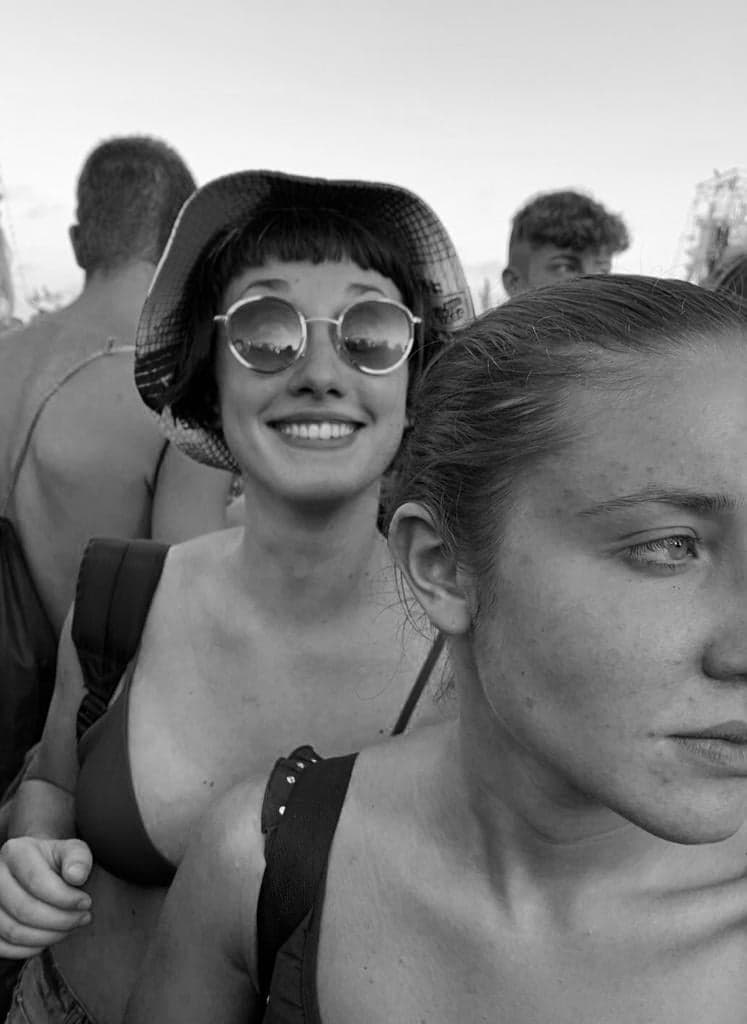
Meanwhile in Italy
Ferri’s family are not entirely at ease with developments in her new country: “They think that we might risk having to close up again. They cannot believe that we’re already opening hairdressers and tattoo salons.”
As for Italy, though the numbers are still terrible, it’s gradually becoming less severe and the country is looking to begin the process of opening up very soon. I asked Ferri: “I’m wondering whether you see any loosening in your friends – in their behaviour or the way they think?”
“No. But they hope they can go out in May, because they really need to do something now. They’ve been at home in quarantine since March 8.”
“So there’s no taking it less seriously in Italy yet?”
“No, no, no.”


